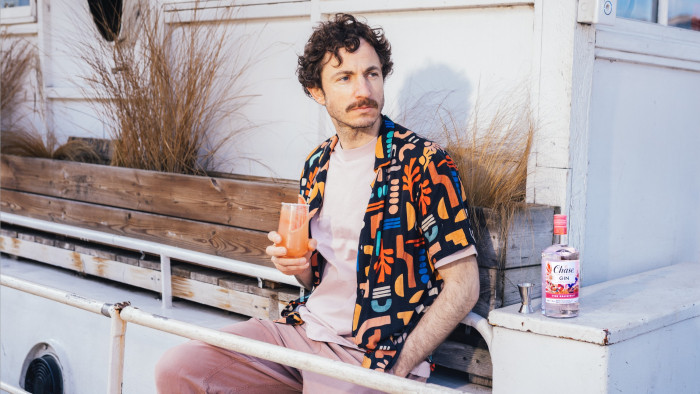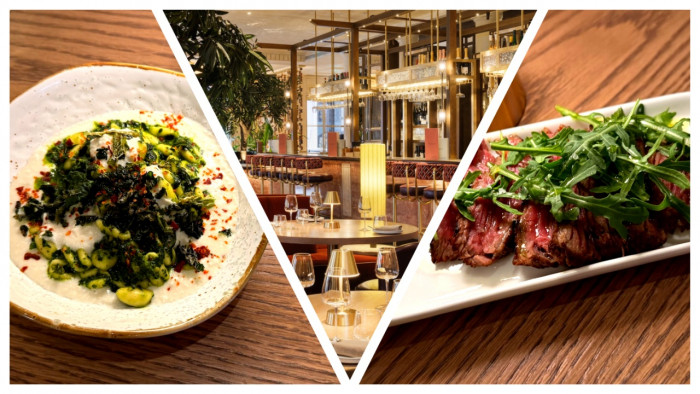“I’ve seen men executing other people and then eating them”: Seven life lessons learned by a war reporter
War reporter James Brabazon on fear, courage and humanity in the world's most dangerous places


James Brabazon, 46, has dedicated his life to documenting the most brutal warzones on Earth. From Liberia to Pakistan, Afghanistan to Syria, the British filmmaker’s memory is heavier with blood than a sponge in a slaughterhouse. He has filmed murders and executions, dodged rockets, met warlords and witnessed horrors even Hollywood’s most desperate screenwriters would be too squeamish to write down.
“I’ve seen people executing other people and then eating them,” he says. “But the thing that most disturbed me is that those people, once you’ve removed the trappings of war, are just like you and me. At the end of the day you look into the eyes of someone who’s just executed a prisoner and what you’re really seeing is yourself looking back; another human.”
But, while he has borne witness to extreme levels of human cruelty, he has also seen overwhelming moments of kindness, even in the most desperate of places.
“Whether you’re a Nazi, a Liberian rebel, or you or me, we all have one thing in common: humanity,” he says. “And in there lies both the possibility of our damnation and our salvation.”
Here, James shares seven lessons he learned on the frontline.

James filming in Kobani, Syria, 2015
1. Going to war doesn’t make you a man
My grandfathers are why I became a war journalist. They both fought during the Second World War and instilled in me a strong legacy of storytelling: not just their many tales of heroism, but also the question of why men fight and what the purpose of war is. Through their stories I developed a wanderlust and became mesmerised by war-time writers such as Patrick Leigh Fermor and Laurie Lee. But what had been really underlined by my grandfathers was that there needed to be some sort of moral purpose.
I fundamentally misunderstood what this meant. As a young man, I thought that the most effective way in which I could prove myself – and the most morally purposeful thing that I could do – was going to war.
In my imagination it served a dual purpose. On the one hand, it would automatically imbue everything I did with a sense of moral imperative. On the other, it would be the one thing that I could do that would prove that I was a man. I wanted an adventure; experience with a capital ‘E’. I wanted to do something that was cool and had meaning. I wanted a moral purpose.

A child soldier in Liberia, 2002
2. There is nothing noble about war
I didn’t find a moral imperative at war, and certainly nothing brave or noble. War is obscene and disgusting. Any illusions that anyone has about The Glorious Dead are very quickly dispelled because, actually, there’s nothing glorious about being dead. You’re just dead. When you’ve seen enough people turned inside out with high-explosive or high-velocity ammunition, you learn death is irredeemable.
The plus side is that I realised two things: my grandparents didn’t go to war because they wanted to but because they needed to. Second, the reason people go to war and the reason they stay are two very different things.
It was the realisation of what keeps people at war that kept me in conflict zones for the rest of my working life. The world needs to know their stories.
As WB Yeats said, “The truth can never be discovered; it can only be revealed.” That’s what I found in Liberia in 2002, while embedded with Liberians United for Reconciliation and Democracy (LURD), a rebel group fighting to overthrow President Charles Taylor.
I wasn’t fighting for my own survival. I went looking for something that I would never find.

In rebel-held Liberia, 2002
3. War is not about you
The rebels I was with had captured a government soldier. They’d stripped him down to his underpants and tied his hands behind his back. He was a beautiful young man in his late teens – an exquisite human being, physically, and completely vulnerable – surrounded by angry, armed men.
Yet I thought the fact that I was there would offer him a measure of protection, that they wouldn’t kill him on camera. There was a moment – you can see it on the tape – where he looked at me and smiled, almost wrily. I thought he was thinking what I was thinking.
“War is obscene. When you’ve seen enough people turned inside out, you learn death is irredeemable.”
It was so naive, so profoundly egotistical, to think that the white man with the camera would save him. Moments later, they knelt him down and shot him in the back.
It taught me another very valuable lesson: war, or the experience of it, isn’t about you. Imagining that my presence was going to save this man and somehow salve my conscience was nonsense. I realised then that my responsibility wasn’t to my own experience, but to the stories of the people I was encountering.

Bitten by a crocodile in Zimbabwe, 2000
4. Kindness exists in hell
My grandfather said to me once that war is the only opportunity that most men have to show unconditional love for each other. In many ways I agree with him. Although war is an obscenity, it is also an opportunity for people to show courage, compassion and love. I have seen so many selfless acts of bravery – from soldiers recovering their fallen comrades under fire to doctors braving air strikes to help stranded children – that I don’t know where to begin.
The most extreme act of kindness that I was shown at war was in northern Liberia when I was, quite probably, dying of the consequences of a week of severe amoebic dysentery. One of the villagers walked for around 50 miles through hostile jungle to a remote outpost where he thought there might be some medical supplies. It took him two days, walking day and night, and he returned with one course of antibiotics – the last remaining – that cured the dysentery and set me on the path to recovery.

A US air strike in Kobani, Syria, 2015
5. Danger is a relative perception
People tend to think about risk in terms of what they can see, so the scariest place is where someone’s tried to kill you or where there’s been a firefight or an explosion. But whether a place was quite dangerous or very dangerous, the result is still that you survived.
I wasn’t at war when I came closest to death. I was filming in the Pacific town of Buenaventura, Colombia, where there were street gangs allied either to the Revolutionary Armed Forces of Colombia (FARC) or to the right-wing paramilitaries. A reporter and I were following the Colombian army doing house-to-house searches in a slum built over the sea on stilts.
As the major kicked in a door, the section of the slum collapsed. I fell 12ft into the water, with everything else coming down on top of me. I had on my camera, batteries, belt-pack and boots, and went straight down. I opened my eyes and saw I was a long way underwater. I couldn’t see the surface; debris was everywhere. I ditched my gear and kicked to the surface. Remember, this water was beneath a slum, so we were basically swimming through liquid shit.
I got my head above water and couldn’t see the reporter. Then she surfaced, flailing because she couldn’t swim. I held on to some wood as she climbed up me on to a bit of scaffold. Then I saw our translator, 10ft up, dangling by one arm from a windowsill. Eventually, I managed to clamber out.
I’ve seen close-quarter combat. I’ve seen the guy in front of me shot dead, the guy behind me shot dead. Yet the closest I came to death was when a slum collapsed. Danger is a relative perception.

Under fire in Monrovia, Liberia, 2003
6. Do as you would be done by
I was filming in Liberia again in 2003 with my friend Tim Hetherington. We were in a makeshift hospital on the outskirts of Monrovia that the rebels had captured as they were pushing into town. There was one doctor who was from the government side but had been stuck on the rebel side of the conflict, and he was treating rebel soldiers.
Someone found out and the deputy chief of staff came into the hospital with a group of men. They called the doctor over and took out a pistol. I thought they were going to kill him. I’d seen a lot of executions by this point and turned round to film it. But Tim stopped filming, went up to the deputy chief of staff, grabbed his pistol hand, stood between him and the doctor, and said, “Don’t do it. He’s the only doctor you have.”
They didn’t. At this point I’d been in war for a long time; Tim hadn’t. There was something that remained intact in Tim’s psyche that wasn’t in mine. My mind wasn’t functioning as it should. War is like pig iron on your moral compass. The theory of journalism is one thing; actually functioning as a human is another. Do as you would be done by. If I were bleeding out in a ditch I would want someone to help me.
7. All actions have consequences
I was in Monrovia in 2003 and rebels brought in 15-year-old radio operator who had been shot through the head with an AK-47 round. His name was Rocket and his room was next to where I was sleeping. At night he started to scream, not like a human, like an animal in pain.
I went into his room. Here was a boy, curled up on a mattress with two bits of dressing where the bullet had entered and left his head. He was balled up screaming, clearly profoundly damaged, physically and mentally by what had happened. It seemed to me extremely obvious he was going to die a slow and excruciating death… in the jungle… with no painkillers.
“I was cared of killing him, of taking someone else’s life. So I left him to die in agony”
I had enough morphine in my bag to offer him a swift and peaceful transition out of it. I knelt down, took out the syringe and morphine vile and looked at him. I thought about it. I really thought about it. But sometimes the voice inside you is louder than the gunfire outside. I put the syringe and vile back in my bag. I guess I was scared. Scared of killing him, of taking someone else’s life. So I left him to die in agony.
I returned to the camp a few days later. And there, to my astonishment, was Rocket, sitting in a chair listening to the radio. He was profoundly brain damaged, but the rebels were looking after him and he was able to feed himself. His life had changed beyond all recognition and irrevocably. But it’s still a life. Sometimes inaction is still action. And all actions have consequences. I’m so glad I didn’t kill Rocket that night.
8. Civility is a mask that slips easily
The veneer of civilisation is thin, and the mask of civility slips very easily. It’s easy to dehumanise people as murderers. Africans, say, may have different colour skin to you; some go into battle in women’s clothing – I even knew a guy who went into battle wearing red Speedos and flip-flops. It’s the same for Isis in Syria, the Taliban in Afghanistan or FARC in Colombia. It’s easy to dismiss these people as savages as they don’t look like you.
But many of these people had jobs, families and lives before the war. And then you think, “Actually, not so long ago, ‘civilised’ Europeans were shovelling millions of people into gas chambers.”
The potential to behave like that is within all of us. Not everyone who goes to war commits murder, and not everyone who kills in war is a murderer. But does every society have within it the capacity to foster murderers on that scale? Absolutely. Is it inherent to a particular kind of society? I don’t believe so. Is it something that is inherent in us as human beings? Well, that appears to be the only option left.
James’s book The Break Line is out now (£12.99, Michael Joseph) available to order now
Read more
- “The place is just a hate factory”: A prison officer on the reality of life inside
- “I hated every woman”: Former incels explain how their virginity evolved into rage
- Why is Britain suffering from an ecstasy overdose?
Sign up to the ShortList newsletter for daily great reads
Latest
Related Reviews and Shortlists









